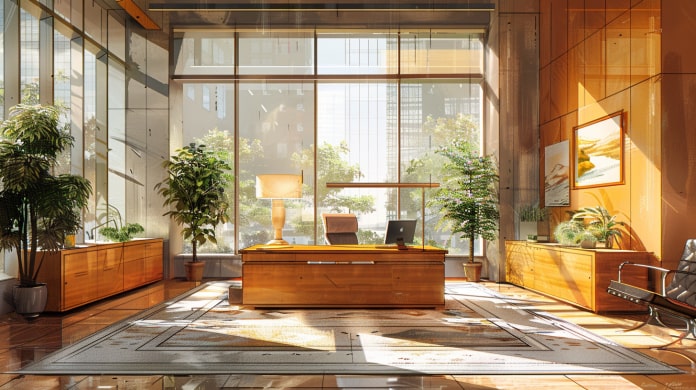



A 2-day immersion into the future of sustainable construction
Introduction
Welcome to the future of workspaces, where sustainability isn’t just a buzzword—it’s the blueprint for innovation, productivity, and environmental stewardship. As we delve into the world of green offices and eco-friendly business practices, we’re not just talking about saving the planet. We’re exploring a revolution that enhances brand reputation, employee well-being, and, yes, even the bottom line. So, buckle up! We’re about to embark on a journey that redefines the modern workplace.
Understanding Sustainable Business Spaces
What’s the Big Deal?
Imagine a workspace that breathes life—not just metaphorically but literally. Plants line the walls, natural light floods the room, and the air is crisp and clean. But sustainable business spaces go beyond aesthetics. They embody efficiency, waste reduction, and a profound respect for the environment. These spaces are not just places to work; they are ecosystems that promote health, creativity, and productivity.
The Triple Bottom Line: People, Planet, Profit
The magic of sustainable business spaces lies in their ability to hit the sweet spot—the intersection where environmental responsibility meets economic gain and social equity. Here’s the breakdown:
- People: Creating a healthy, vibrant environment for employees boosts morale and productivity.
- Planet: Every green initiative, from recycling programs to energy-efficient lighting, contributes to a healthier planet.
- Profit: Sustainability isn’t just good for the earth; it’s good for business. Eco-friendly practices can lead to significant cost savings and attract eco-conscious consumers.
Sustainable Business Spaces: Strategic Intervention Points for Sustainable Transformation
Sustainability in business isn’t about making one big leap; it’s about integrating small, impactful changes throughout the organization. Here’s where you can start:
- Rethink Resources
- Use recycled materials whenever possible.
- Implement strict recycling protocols.
- Energy Efficiency
- Switch to LED lighting.
- Invest in energy-efficient appliances and systems.
- Green Transportation
- Encourage carpooling, biking, or the use of public transport.
- Provide incentives for employees who choose green commuting options.
- Sustainable Sourcing
- Choose suppliers and products that prioritize sustainability.
- Look for certifications like Fair Trade or Rainforest Alliance.
- Employee Engagement
- Involve employees in green initiatives.
- Offer workshops and training on sustainable practices.
- Community Impact
- Engage in local environmental projects.
- Support green local businesses.
- Innovate and Iterate
- Constantly seek new ways to improve sustainability.
- Measure, track, and report on your progress.
Strategic Intervention Points for Sustainable Transformation
In the quest for sustainability, businesses face the dual challenge of driving financial returns while contributing positively to society and the environment. The concept of Strategic Intervention Points (SIPs) serves as a roadmap for companies eager to redefine their operations for the greater good.
Innovating for Resilient Business Models
Innovation is the lifeblood of sustainability. It’s not just about replacing plastic straws with paper ones; it’s a whole-system overhaul. From harnessing renewable energy to adopting circular economy principles, the opportunities for innovation are boundless. For example, consider the case of a company transitioning to sustainable packaging. This move not only reduces environmental impact but can also resonate deeply with consumers, enhancing brand loyalty.
Sustainable Business Spaces: Key Areas of Innovation:
- Shift to sustainable materials: Like the transition from plastic to biodegradable packaging.
- Embrace circular economy models: Design products with their end-of-life in mind, ensuring they can be reused, recycled, or composted.
- Leverage technology: Use digital tools to optimize resource use and reduce waste.
Technological Advances and Sustainability
The digital era has ushered in unprecedented opportunities for sustainability. From blockchain for traceability in supply chains to AI-driven energy efficiency in buildings, technology is a powerful ally in the sustainable transformation journey.
Exciting Technological Frontiers:
- Blockchain for transparency: Ensuring the ethical sourcing of materials.
- AI and IoT for efficiency: Smart systems for energy, water, and waste management.
- Renewable energy tech: Innovations in solar, wind, and bioenergy that are making clean power more accessible and affordable.
Green Real Estate: Challenges and Opportunities
The buildings we occupy play a significant role in our environmental footprint. Green real estate isn’t just a trend; it’s a necessity. Challenges such as upfront costs and regulatory hurdles exist, but the benefits — reduced operational costs, improved occupant health, and a lower carbon footprint — make it a compelling proposition.
Overcoming Challenges:
- Financial incentives: Tax breaks and subsidies can make green buildings more financially viable.
- Regulatory support: Building codes and standards that encourage or require sustainable practices.
- Educating stakeholders: From investors to tenants, everyone needs to understand the value of green real estate.
Sustainable transformation is a complex but rewarding journey. It requires a commitment to innovation, an embrace of technology, and a strategic approach to green real estate. With these elements in play, businesses can thrive while making a positive impact on the planet and society.


Creating a Sustainable Business Spaces
Transforming an office into a beacon of sustainability is not just about making a statement; it’s about setting a new standard for the way we work. From the break room to the boardroom, every corner of your office can be a testament to your commitment to the planet.
Practical Steps for Sustainable Business Spaces
Transforming your office into a sustainable space doesn’t have to be daunting. Start with simple, actionable steps that make a big impact.
- Recycling and Composting Initiatives
- Bins Everywhere: Place recycling bins throughout the office, clearly marked for paper, plastics, and metals.
- Compost Collection: Set up a compost bin for food waste. Partner with a local farm or garden that can use it as fertilizer.
- Energy Efficiency
- Light It Right: Swap out incandescent bulbs for LED or compact fluorescent bulbs.
- Smart Sensors: Install motion detectors to turn off lights in unoccupied rooms.
- Sustainable Supplies
- Eco-friendly Office Supplies: Opt for recycled paper products, refillable pens, and other green office materials.
- Green Cleaning: Use biodegradable and non-toxic cleaning products.
Sustainable Business Spaces: Recycling and Composting Strategies
Efficient waste management is a cornerstone of a sustainable office. A well-organized recycling and composting program not only reduces your environmental footprint but can also inspire your team to adopt greener habits at home.
| Waste Type | Recycling Bin Color | Notes |
|---|---|---|
| Paper | Blue | Including newspapers, magazines |
| Plastics | Green | Clean containers only |
| Metals | Yellow | Aluminum cans, small metal items |
| Food Waste | Brown | For composting |
Energy-saving Tips and Green Technology Implementation
Reducing energy consumption is key to a greener office. Here are some smart tips and technologies to help cut down on energy use and costs.
- Adjust Your Thermostat: Even a small adjustment can lead to significant savings.
- Use Smart Power Strips: To automatically turn off appliances when not in use.
- Encourage Remote Work: Less commuting and office energy use can significantly reduce your carbon footprint.
Sustainable Business Spaces as a Model
Coworking spaces have been at the forefront of the sustainability movement, integrating green practices into the very fabric of their operations. They offer invaluable lessons for any business looking to go green.
Case Studies of Sustainable Business Spaces
Let’s look at how some coworking spaces have embraced sustainability:
- Green Spaces: Located in Denver, this coworking space utilizes over 160 solar panels and offers recycling and composting services.
- WeWork: Known for its commitment to sustainability, focusing on reducing carbon footprint through renewable energy purchases.
- ECO-SYSTM: An innovative space in the Bay Area that encourages a sustainable lifestyle among its members.
Sustainable Business Spaces: The Importance of Community and Collaboration
Community and collaboration are at the heart of sustainable coworking spaces. By fostering a culture of sustainability, these spaces demonstrate the power of collective action in driving environmental change.
- Networking Events: Hosting events focused on sustainability topics to educate and engage members.
- Collaborative Projects: Encouraging members to work together on green initiatives.
Sustainable coworking spaces are living proof that when businesses come together, they can create environments that are not only productive but also positive for the planet.
Sustainable Business Spaces: Conclusion
In conclusion, the path to creating sustainable business environments is both a challenge and an opportunity for innovation and leadership in sustainability. By adopting green practices, businesses not only contribute to the health of the planet but also inspire broader societal shifts towards sustainability. The collective efforts of businesses, big and small, in integrating sustainability into their workspaces underscore the critical role the corporate sector plays in driving positive environmental change. As we move forward, the lessons and strategies outlined in the journey towards sustainable business spaces serve as a blueprint for ongoing commitment to sustainability, emphasizing the importance of each step taken towards a greener, more sustainable future for all.
If you want o learn about our consultancies in Portuguese language, click here.






A 2-day immersion into the future of sustainable construction

